Các đặc điểm của đánh giá trực tuyến hữu ích đến mức nào? Auan sát thông qua các kênh OTA
Bài báo tập trung thảo luận về mức độ tác động của các đặc điểm của đánh giá trực tuyến
bao gồm nội dung, xếp hạng đánh giá, giá trị, tính kịp thời, độ dài và hình thức lên quyết định
đặt phòng trực tuyến của khách sạn giữa các kênh OTA. Phương pháp hồi quy đa biến được sử
dụng để phân tích dữ liệu từ 421 phản hồi của khách du lịch lưu trú tại các khách sạn vừa và
nhỏ tại Đà Nẵng và qua khảo sát trực tuyến những dã từng đọc đánh giá trực tuyến trên các
trang OTA từ tháng 8 năm 2019 đến tháng 12 năm 2019. Kết quả cho thấy nội dung đánh giá
trực tuyến và đánh giá xếp hạng có mức độ tác động lớn nhất đến quyết định đặt phòng của
khách du lịch tiềm năng trong khi tính kịp thời và hình thức đánh giá trực tuyến cho thấy mức độ
ảnh hưởng thấp hơn. Đặc biệt, độ dài của các bài đánh giá trực tuyến không thu hút được sự
quan tâm của độc giả khi tìm kiếm chỗ ở cho những chuyến đi của họ. Ngoài ra, kết quả cho thấy
mối quan hệ tích cực giữa giá trị của đánh giá trực tuyến và ý định đặt phòng đối với một khách
sạn. Nghiên cứu này cung cấp một cái nhìn lý thuyết về mức độ ảnh hưởng của sáu đặc điểm
chung của các bài đánh giá trực tuyến.
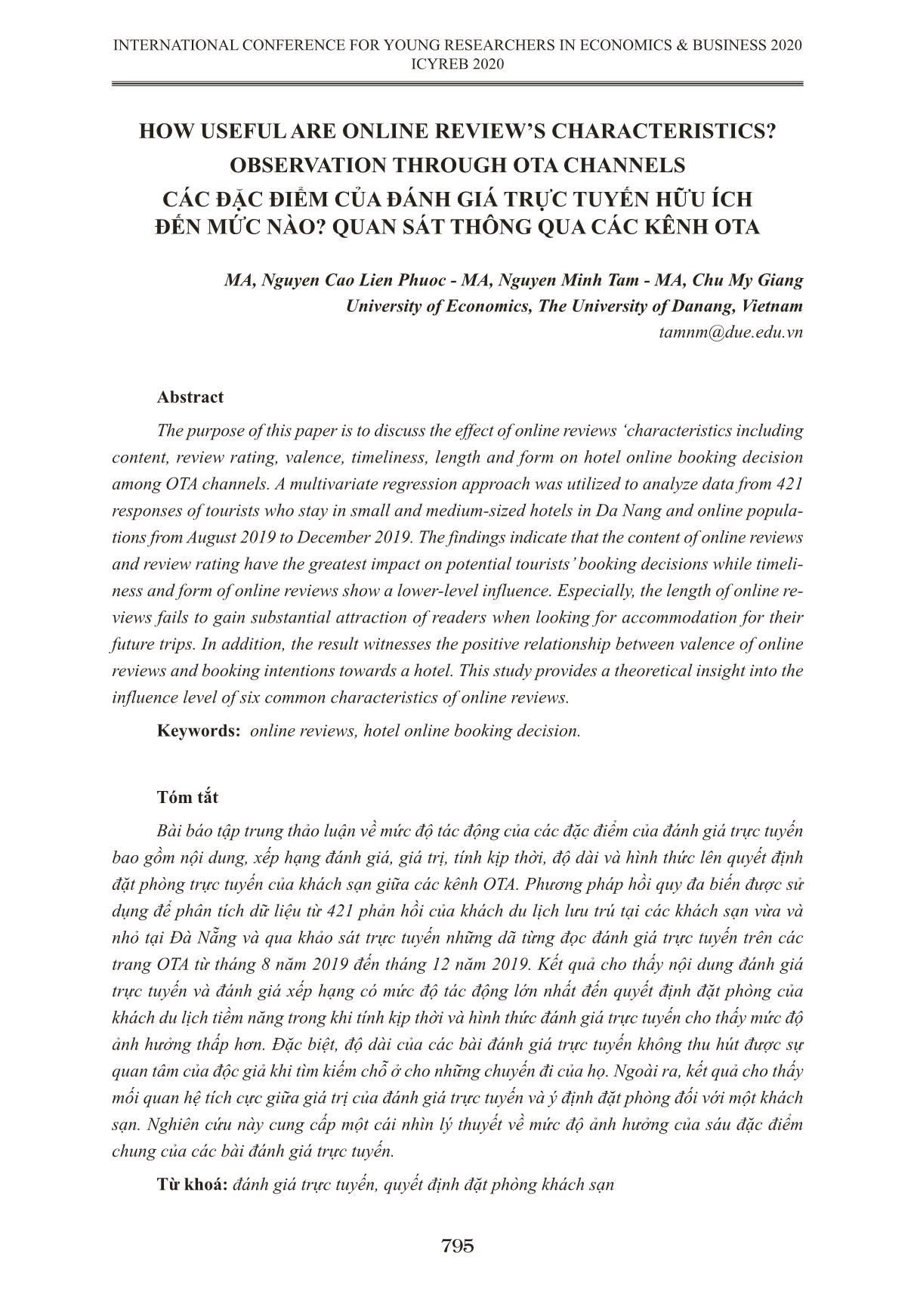
Trang 1
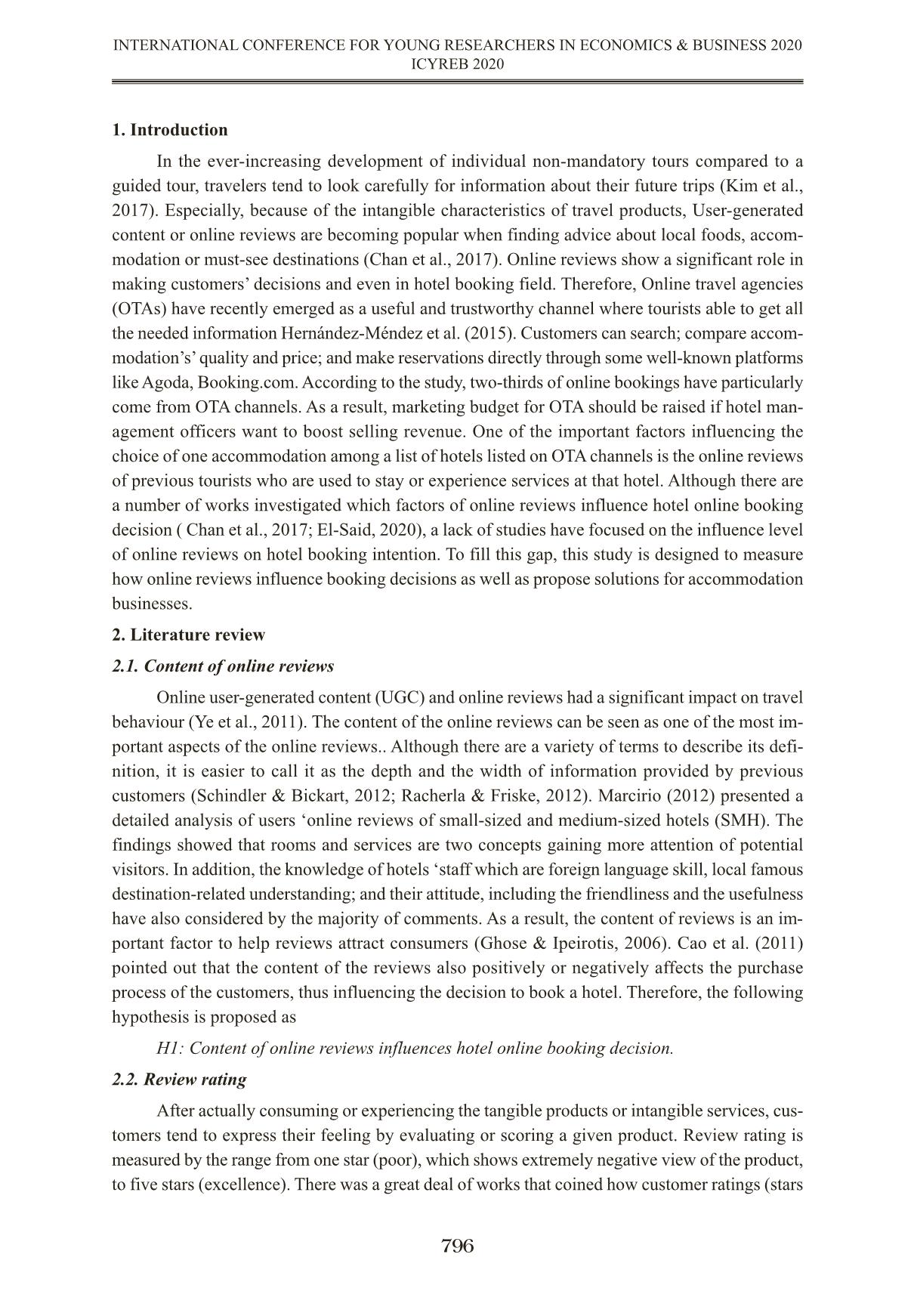
Trang 2
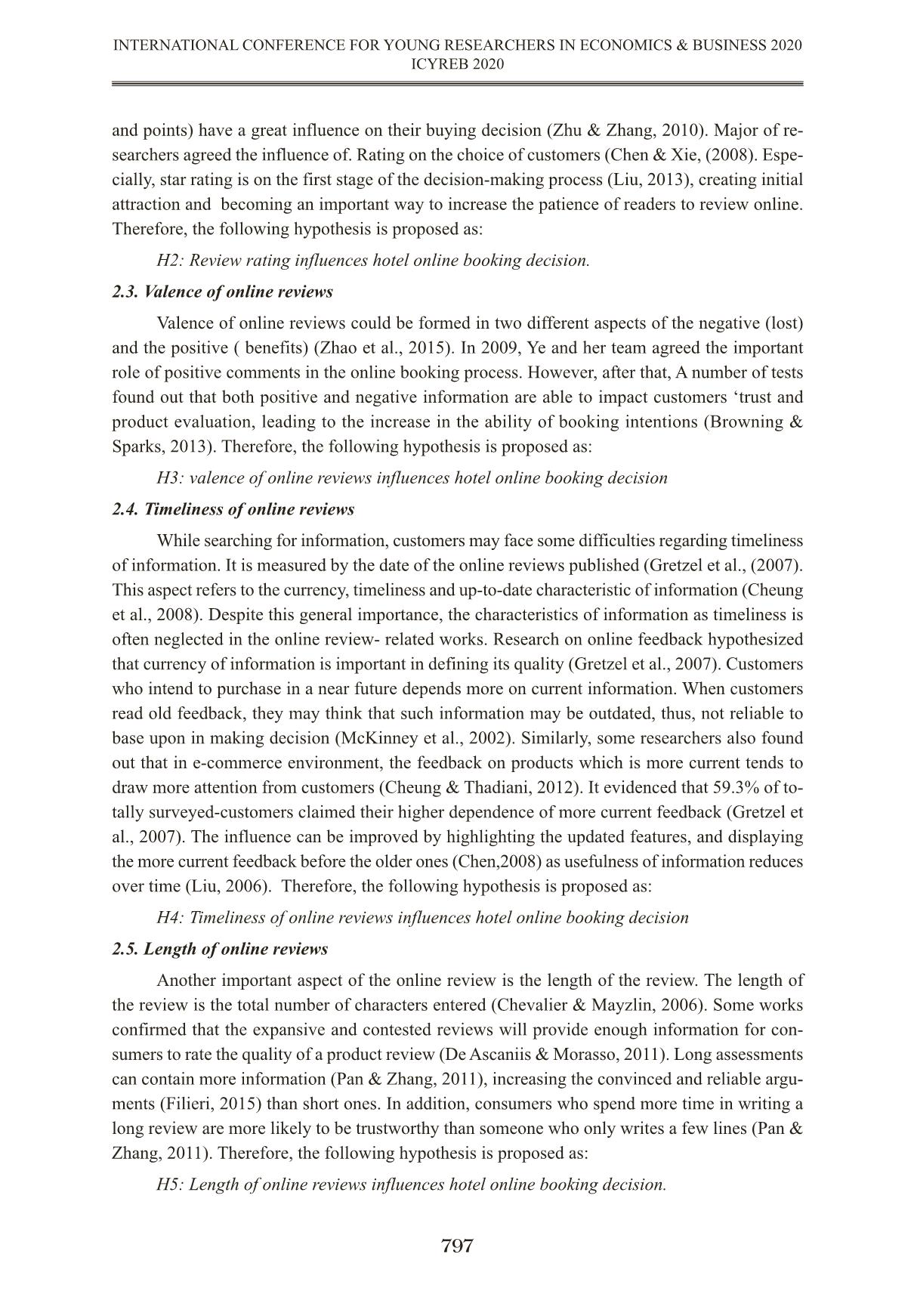
Trang 3
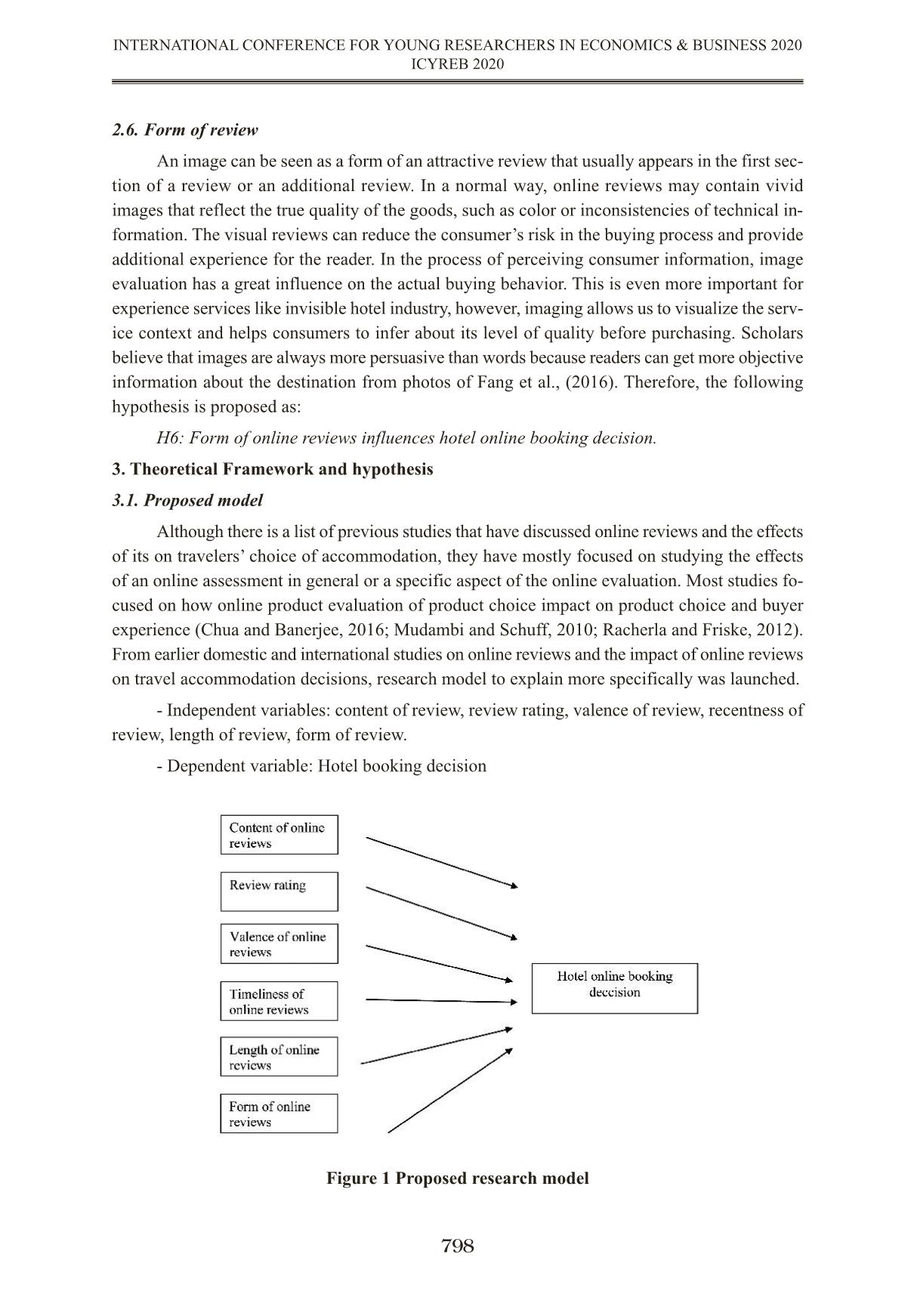
Trang 4
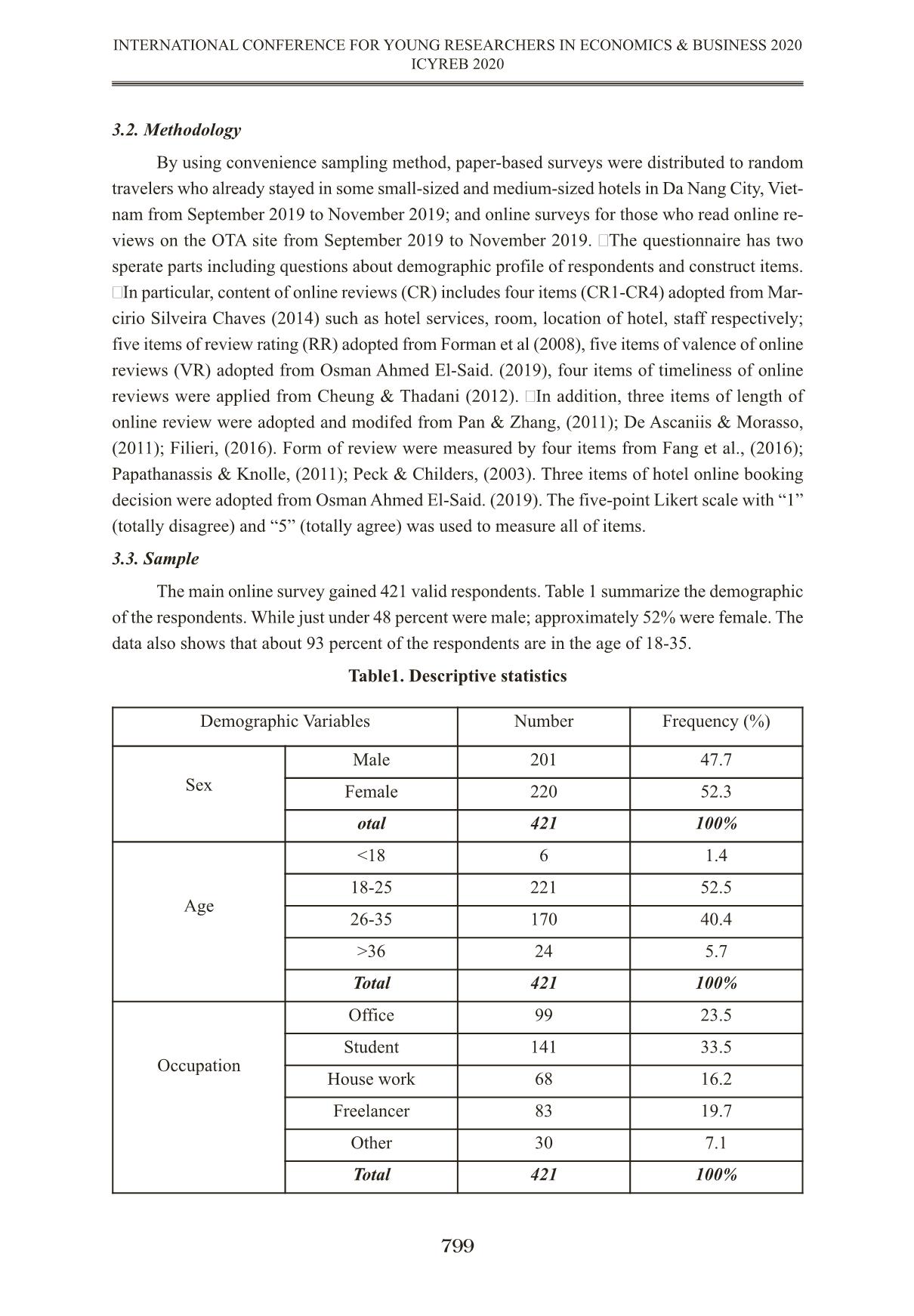
Trang 5
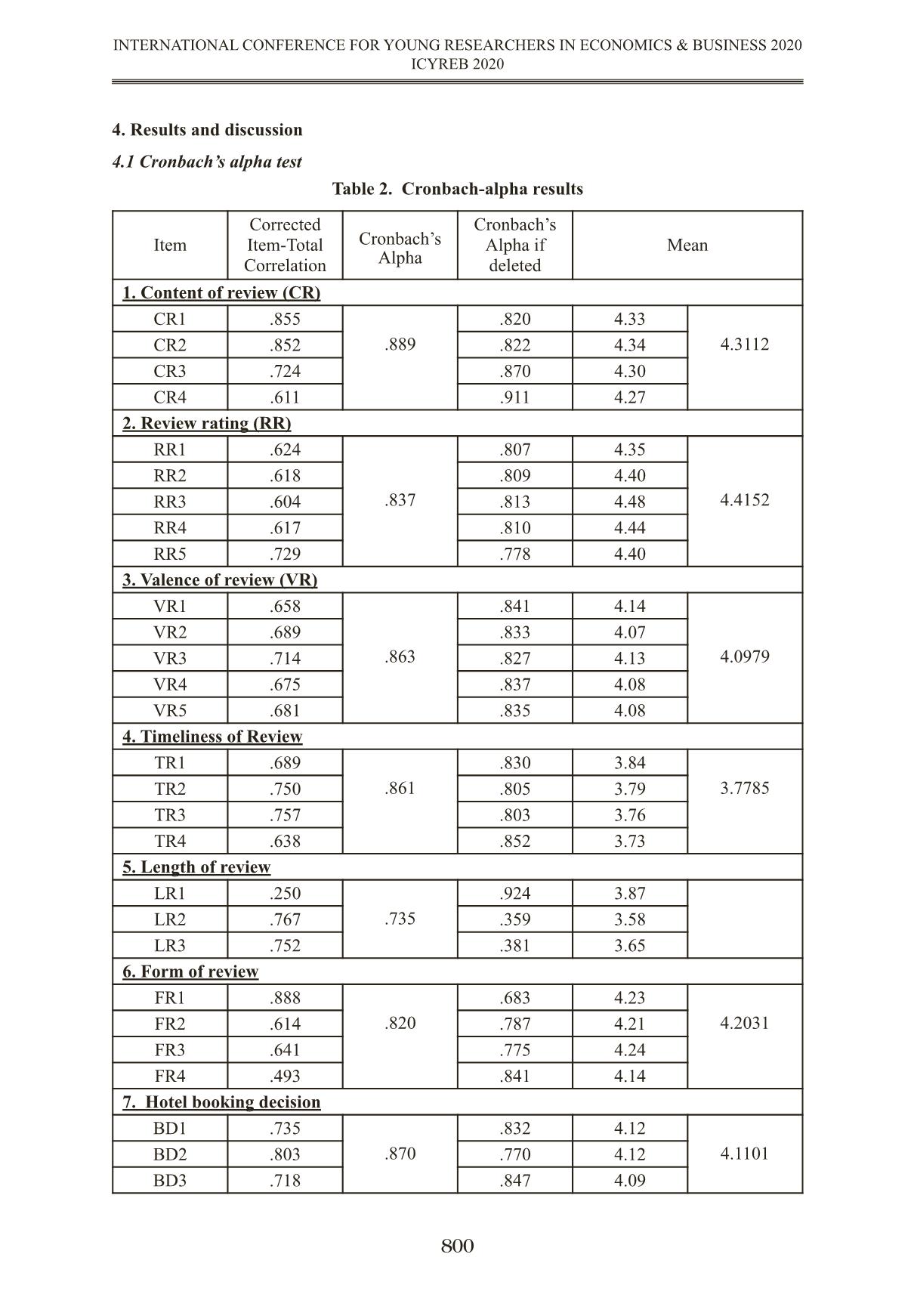
Trang 6
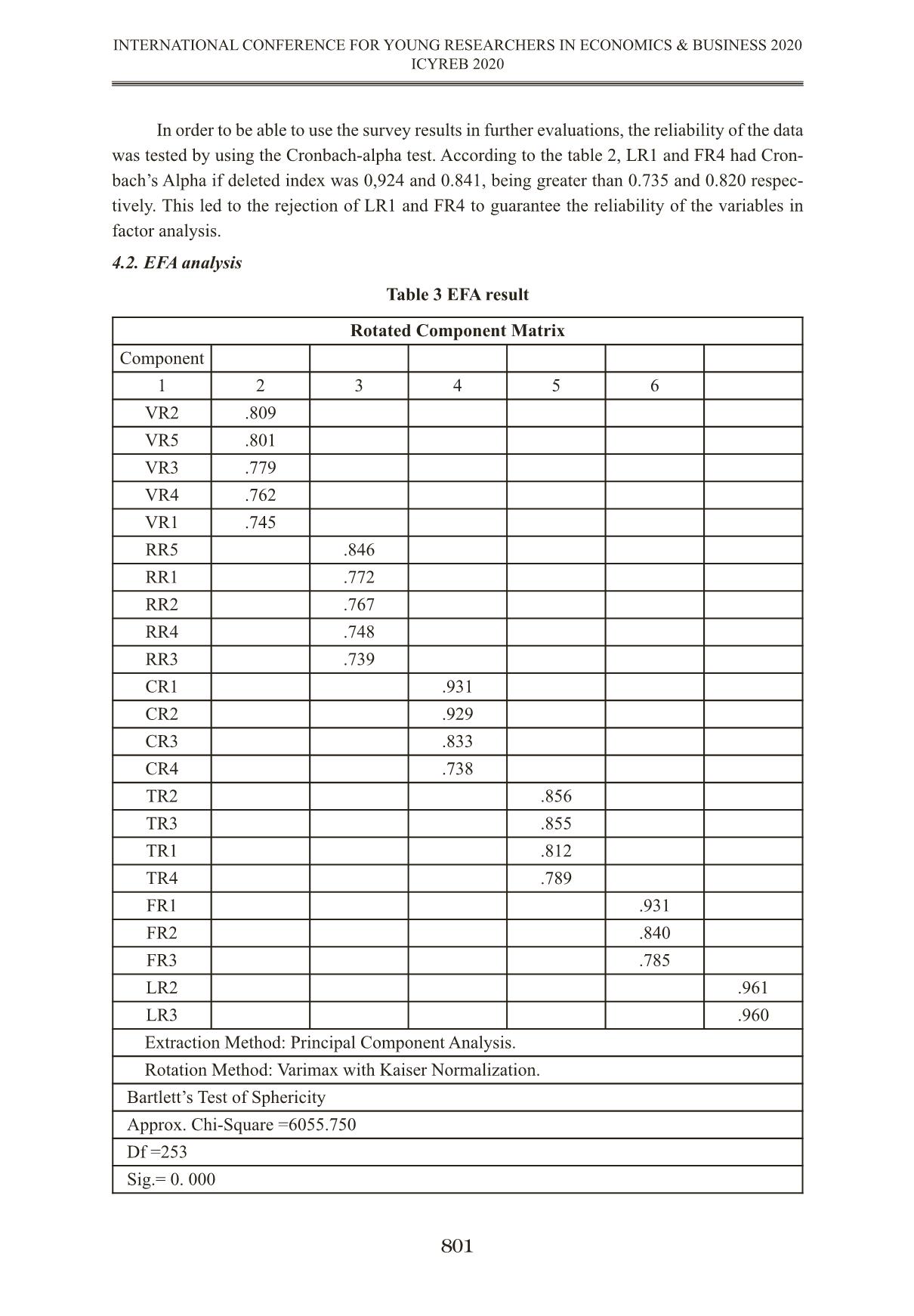
Trang 7
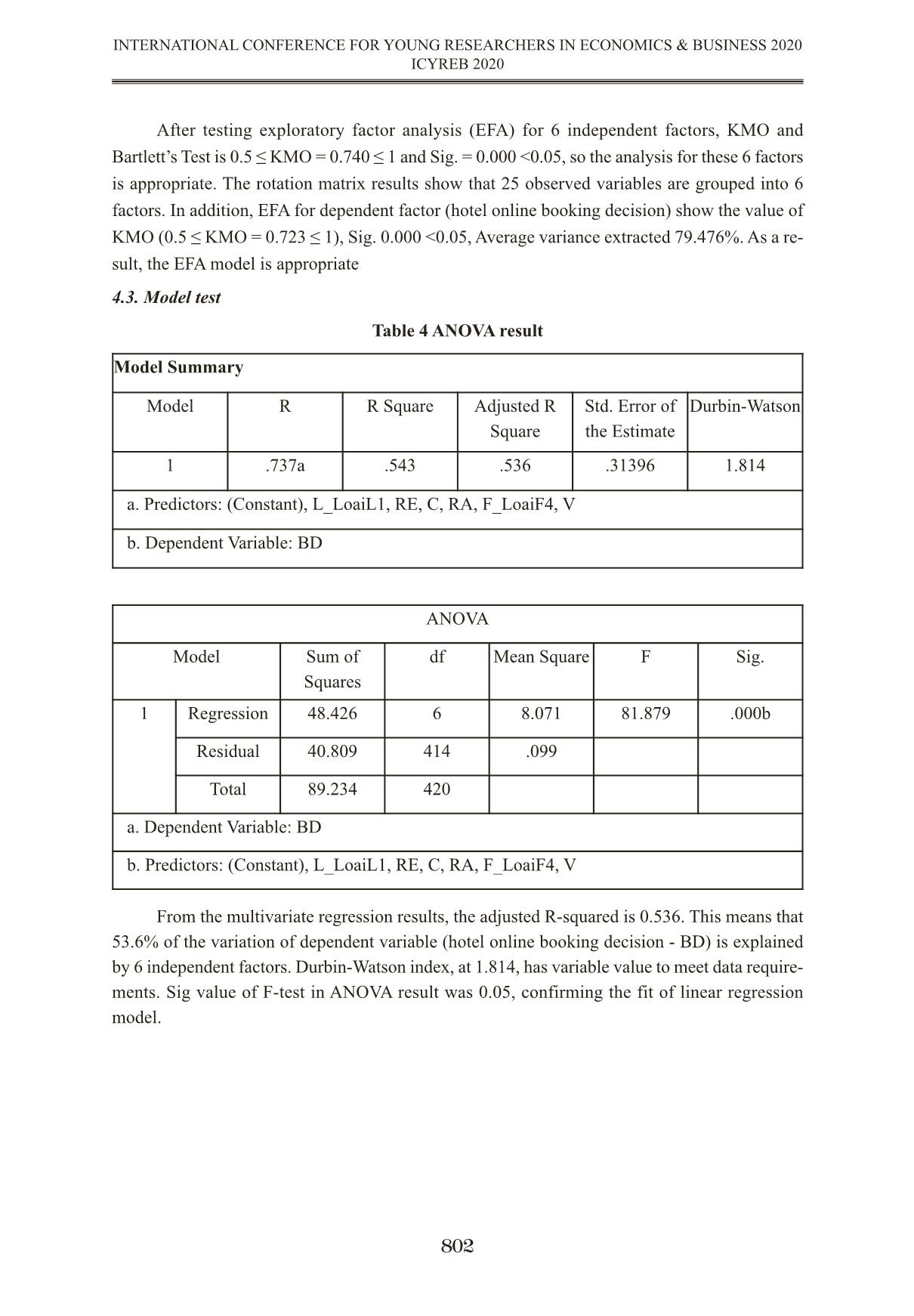
Trang 8
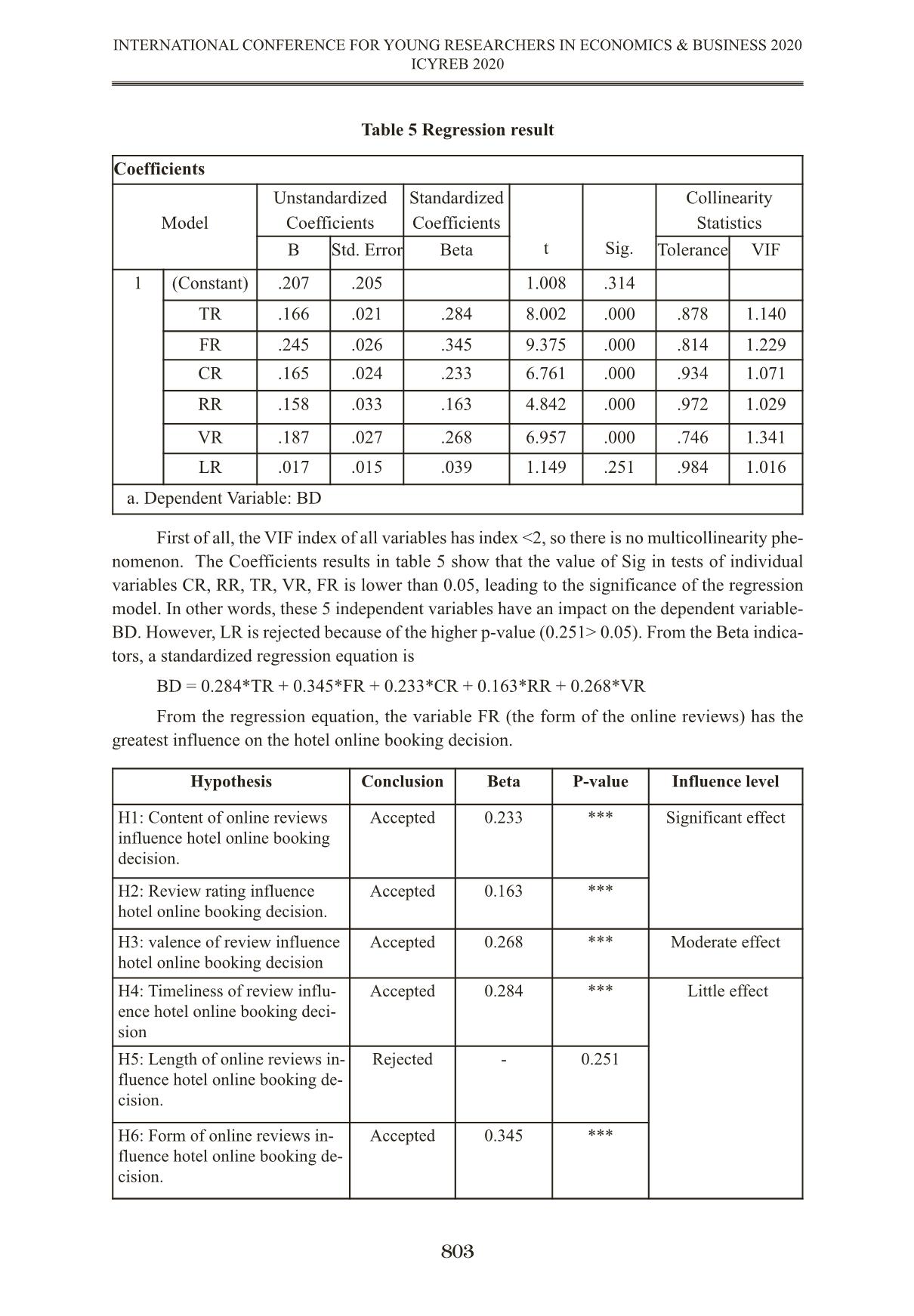
Trang 9
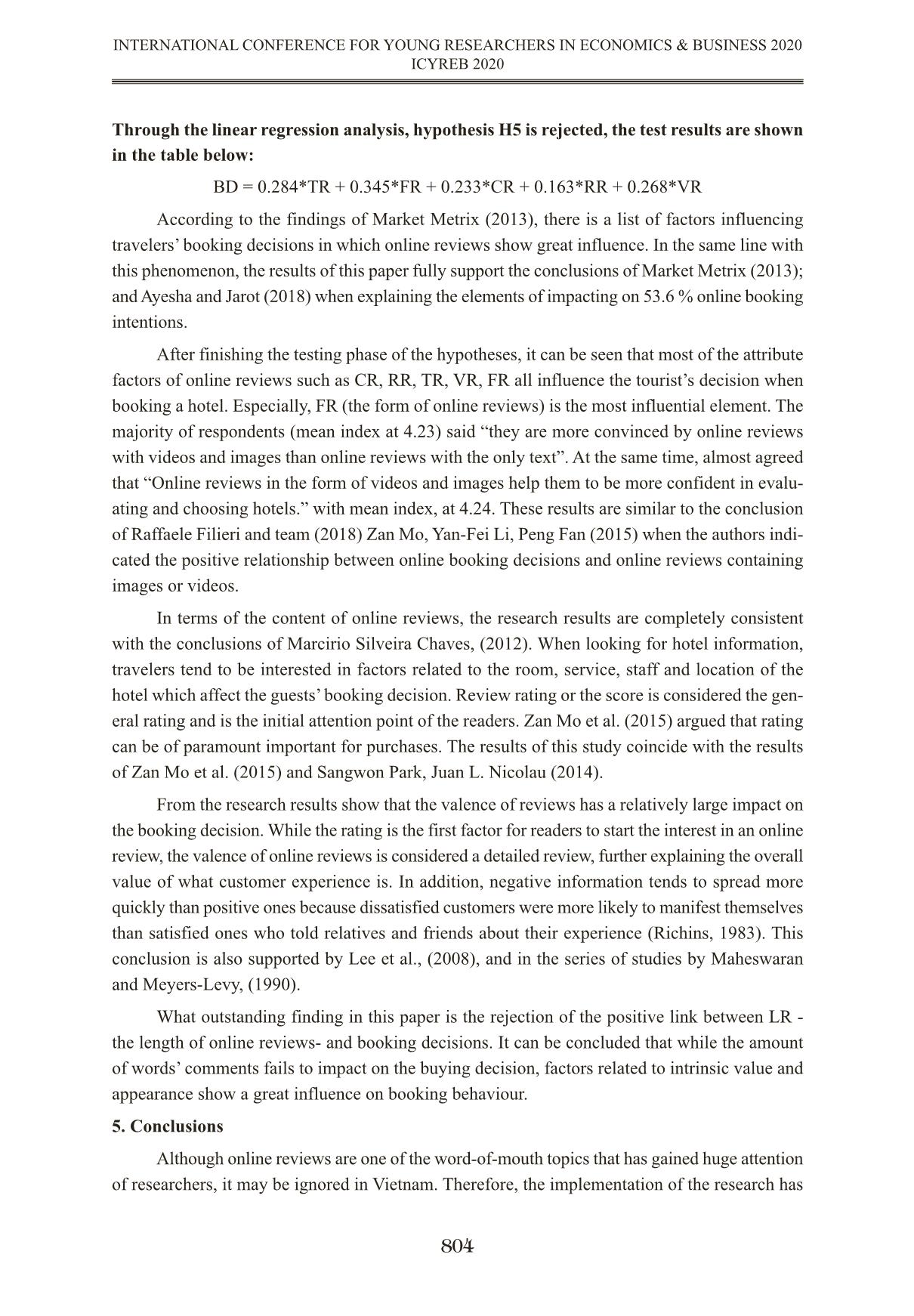
Trang 10
Tải về để xem bản đầy đủ
Tóm tắt nội dung tài liệu: Các đặc điểm của đánh giá trực tuyến hữu ích đến mức nào? Auan sát thông qua các kênh OTA
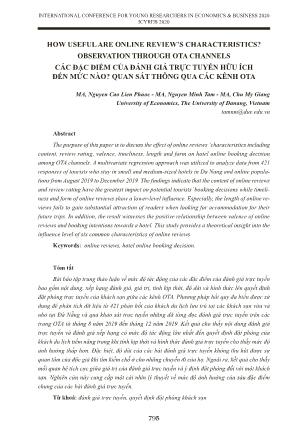
HOW USEFUL ARE ONLINE REVIEW’S CHARACTERISTICS? OBSERVATION THROUGH OTA CHANNELS CÁC ĐẶC ĐIỂM CỦA ĐÁNH GIÁ TRỰC TUYẾN HỮU ÍCH ĐẾN MỨC NÀO? QUAN SÁT THÔNG QUA CÁC KÊNH OTA MA, Nguyen Cao Lien Phuoc - MA, Nguyen Minh Tam - MA, Chu My Giang University of Economics, The University of Danang, Vietnam tamnm@due.edu.vn Abstract The purpose of this paper is to discuss the effect of online reviews ‘characteristics including content, review rating, valence, timeliness, length and form on hotel online booking decision among OTA channels. A multivariate regression approach was utilized to analyze data from 421 responses of tourists who stay in small and medium-sized hotels in Da Nang and online popula- tions from August 2019 to December 2019. The findings indicate that the content of online reviews and review rating have the greatest impact on potential tourists’ booking decisions while timeli- ness and form of online reviews show a lower-level influence. Especially, the length of online re- views fails to gain substantial attraction of readers when looking for accommodation for their future trips. In addition, the result witnesses the positive relationship between valence of online reviews and booking intentions towards a hotel. This study provides a theoretical insight into the influence level of six common characteristics of online reviews. Keywords: online reviews, hotel online booking decision. Tóm tắt Bài báo tập trung thảo luận về mức độ tác động của các đặc điểm của đánh giá trực tuyến bao gồm nội dung, xếp hạng đánh giá, giá trị, tính kịp thời, độ dài và hình thức lên quyết định đặt phòng trực tuyến của khách sạn giữa các kênh OTA. Phương pháp hồi quy đa biến được sử dụng để phân tích dữ liệu từ 421 phản hồi của khách du lịch lưu trú tại các khách sạn vừa và nhỏ tại Đà Nẵng và qua khảo sát trực tuyến những dã từng đọc đánh giá trực tuyến trên các trang OTA từ tháng 8 năm 2019 đến tháng 12 năm 2019. Kết quả cho thấy nội dung đánh giá trực tuyến và đánh giá xếp hạng có mức độ tác động lớn nhất đến quyết định đặt phòng của khách du lịch tiềm năng trong khi tính kịp thời và hình thức đánh giá trực tuyến cho thấy mức độ ảnh hưởng thấp hơn. Đặc biệt, độ dài của các bài đánh giá trực tuyến không thu hút được sự quan tâm của độc giả khi tìm kiếm chỗ ở cho những chuyến đi của họ. Ngoài ra, kết quả cho thấy mối quan hệ tích cực giữa giá trị của đánh giá trực tuyến và ý định đặt phòng đối với một khách sạn. Nghiên cứu này cung cấp một cái nhìn lý thuyết về mức độ ảnh hưởng của sáu đặc điểm chung của các bài đánh giá trực tuyến. Từ khoá: đánh giá trực tuyến, quyết định đặt phòng khách sạn 795 INTERNATIONAL CONFERENCE FOR YOUNG RESEARCHERS IN ECONOMICS & BUSINESS 2020 ICYREB 2020 1. Introduction In the ever-increasing development of individual non-mandatory tours compared to a guided tour, travelers tend to look carefully for information about their future trips (Kim et al., 2017). Especially, because of the intangible characteristics of travel products, User-generated content or online reviews are becoming popular when finding advice about local foods, accom- modation or must-see destinations (Chan et al., 2017). Online reviews show a significant role in making customers’ decisions and even in hotel booking field. Therefore, Online travel agencies (OTAs) have recently emerged as a useful and trustworthy channel where tourists able to get all the needed information Hernández-Méndez et al. (2015). Customers can search; compare accom- modation’s’ quality and price; and make reservations directly through some well-known platforms like Agoda, Booking.com. According to the study, two-thirds of online bookings have particularly come from OTA channels. As a result, marketing budget for OTA should be raised if hotel man- agement officers want to boost selling revenue. One of the important factors influencing the choice of one accommodation among a list of hotels listed on OTA channels is the online reviews of previous tourists who are used to stay or experience services at that hotel. Although there are a number of works investigated which factors of online reviews influence hotel online booking decision ( Chan et al., 2017; El-Said, 2020), a lack of studies have focused on the influence level of online reviews on hotel booking intention. To fill this gap, this study is designed to measure how online reviews influence booking decisions as well as propose solutions for accommodation businesses. 2. Literature review 2.1. Content of online reviews Online user-generated content (UGC) and online reviews had a significant impact on travel behaviour (Ye et al., 2011). The content of the online reviews can be seen as one of the most im- portant aspects of the online reviews.. Although there are a variety of terms to describe its defi- nition, it is easier to call it as the depth and the width of information provided by previous customers (Schindler & Bickart, 2012; R ... .752 .381 3.65 6. Form of review FR1 .888 .820 .683 4.23 4.2031FR2 .614 .787 4.21 FR3 .641 .775 4.24 FR4 .493 .841 4.14 7. Hotel booking decision BD1 .735 .870 .832 4.12 4.1101BD2 .803 .770 4.12 BD3 .718 .847 4.09 In order to be able to use the survey results in further evaluations, the reliability of the data was tested by using the Cronbach-alpha test. According to the table 2, LR1 and FR4 had Cron- bach’s Alpha if deleted index was 0,924 and 0.841, being greater than 0.735 and 0.820 respec- tively. This led to the rejection of LR1 and FR4 to guarantee the reliability of the variables in factor analysis. 4.2. EFA analysis Table 3 EFA result 801 INTERNATIONAL CONFERENCE FOR YOUNG RESEARCHERS IN ECONOMICS & BUSINESS 2020 ICYREB 2020 Rotated Component Matrix Component 1 2 3 4 5 6 VR2 .809 VR5 .801 VR3 .779 VR4 .762 VR1 .745 RR5 .846 RR1 .772 RR2 .767 RR4 .748 RR3 .739 CR1 .931 CR2 .929 CR3 .833 CR4 .738 TR2 .856 TR3 .855 TR1 .812 TR4 .789 FR1 .931 FR2 .840 FR3 .785 LR2 .961 LR3 .960 Extraction Method: Principal Component Analysis. Rotation Method: Varimax with Kaiser Normalization. Bartlett’s Test of Sphericity Approx. Chi-Square =6055.750 Df =253 Sig.= 0. 000 After testing exploratory factor analysis (EFA) for 6 independent factors, KMO and Bartlett’s Test is 0.5 ≤ KMO = 0.740 ≤ 1 and Sig. = 0.000 <0.05, so the analysis for these 6 factors is appropriate. The rotation matrix results show that 25 observed variables are grouped into 6 factors. In addition, EFA for dependent factor (hotel online booking decision) show the value of KMO (0.5 ≤ KMO = 0.723 ≤ 1), Sig. 0.000 <0.05, Average variance extracted 79.476%. As a re- sult, the EFA model is appropriate 4.3. Model test Table 4 ANOVA result From the multivariate regression results, the adjusted R-squared is 0.536. This means that 53.6% of the variation of dependent variable (hotel online booking decision - BD) is explained by 6 independent factors. Durbin-Watson index, at 1.814, has variable value to meet data require- ments. Sig value of F-test in ANOVA result was 0.05, confirming the fit of linear regression model. 802 INTERNATIONAL CONFERENCE FOR YOUNG RESEARCHERS IN ECONOMICS & BUSINESS 2020 ICYREB 2020 Model Summary Model R R Square Adjusted R Square Std. Error of the Estimate Durbin-Watson 1 .737a .543 .536 .31396 1.814 a. Predictors: (Constant), L_LoaiL1, RE, C, RA, F_LoaiF4, V b. Dependent Variable: BD ANOVA Model Sum of Squares df Mean Square F Sig. 1 Regression 48.426 6 8.071 81.879 .000b Residual 40.809 414 .099 Total 89.234 420 a. Dependent Variable: BD b. Predictors: (Constant), L_LoaiL1, RE, C, RA, F_LoaiF4, V Table 5 Regression result First of all, the VIF index of all variables has index <2, so there is no multicollinearity phe- nomenon. The Coefficients results in table 5 show that the value of Sig in tests of individual variables CR, RR, TR, VR, FR is lower than 0.05, leading to the significance of the regression model. In other words, these 5 independent variables have an impact on the dependent variable- BD. However, LR is rejected because of the higher p-value (0.251> 0.05). From the Beta indica- tors, a standardized regression equation is BD = 0.284*TR + 0.345*FR + 0.233*CR + 0.163*RR + 0.268*VR From the regression equation, the variable FR (the form of the online reviews) has the greatest influence on the hotel online booking decision. 803 INTERNATIONAL CONFERENCE FOR YOUNG RESEARCHERS IN ECONOMICS & BUSINESS 2020 ICYREB 2020 Coefficients Model Unstandardized Coefficients Standardized Coefficients t Sig. Collinearity Statistics B Std. Error Beta Tolerance VIF 1 (Constant) .207 .205 1.008 .314 TR .166 .021 .284 8.002 .000 .878 1.140 FR .245 .026 .345 9.375 .000 .814 1.229 CR .165 .024 .233 6.761 .000 .934 1.071 RR .158 .033 .163 4.842 .000 .972 1.029 VR .187 .027 .268 6.957 .000 .746 1.341 LR .017 .015 .039 1.149 .251 .984 1.016 a. Dependent Variable: BD Hypothesis Conclusion Beta P-value Influence level H1: Content of online reviews influence hotel online booking decision. Accepted 0.233 *** Significant effect H2: Review rating influence hotel online booking decision. Accepted 0.163 *** H3: valence of review influence hotel online booking decision Accepted 0.268 *** Moderate effect H4: Timeliness of review influ- ence hotel online booking deci- sion Accepted 0.284 *** Little effect H5: Length of online reviews in- fluence hotel online booking de- cision. Rejected - 0.251 H6: Form of online reviews in- fluence hotel online booking de- cision. Accepted 0.345 *** Through the linear regression analysis, hypothesis H5 is rejected, the test results are shown in the table below: BD = 0.284*TR + 0.345*FR + 0.233*CR + 0.163*RR + 0.268*VR According to the findings of Market Metrix (2013), there is a list of factors influencing travelers’ booking decisions in which online reviews show great influence. In the same line with this phenomenon, the results of this paper fully support the conclusions of Market Metrix (2013); and Ayesha and Jarot (2018) when explaining the elements of impacting on 53.6 % online booking intentions. After finishing the testing phase of the hypotheses, it can be seen that most of the attribute factors of online reviews such as CR, RR, TR, VR, FR all influence the tourist’s decision when booking a hotel. Especially, FR (the form of online reviews) is the most influential element. The majority of respondents (mean index at 4.23) said “they are more convinced by online reviews with videos and images than online reviews with the only text”. At the same time, almost agreed that “Online reviews in the form of videos and images help them to be more confident in evalu- ating and choosing hotels.” with mean index, at 4.24. These results are similar to the conclusion of Raffaele Filieri and team (2018) Zan Mo, Yan-Fei Li, Peng Fan (2015) when the authors indi- cated the positive relationship between online booking decisions and online reviews containing images or videos. In terms of the content of online reviews, the research results are completely consistent with the conclusions of Marcirio Silveira Chaves, (2012). When looking for hotel information, travelers tend to be interested in factors related to the room, service, staff and location of the hotel which affect the guests’ booking decision. Review rating or the score is considered the gen- eral rating and is the initial attention point of the readers. Zan Mo et al. (2015) argued that rating can be of paramount important for purchases. The results of this study coincide with the results of Zan Mo et al. (2015) and Sangwon Park, Juan L. Nicolau (2014). From the research results show that the valence of reviews has a relatively large impact on the booking decision. While the rating is the first factor for readers to start the interest in an online review, the valence of online reviews is considered a detailed review, further explaining the overall value of what customer experience is. In addition, negative information tends to spread more quickly than positive ones because dissatisfied customers were more likely to manifest themselves than satisfied ones who told relatives and friends about their experience (Richins, 1983). This conclusion is also supported by Lee et al., (2008), and in the series of studies by Maheswaran and Meyers-Levy, (1990). What outstanding finding in this paper is the rejection of the positive link between LR - the length of online reviews- and booking decisions. It can be concluded that while the amount of words’ comments fails to impact on the buying decision, factors related to intrinsic value and appearance show a great influence on booking behaviour. 5. Conclusions Although online reviews are one of the word-of-mouth topics that has gained huge attention of researchers, it may be ignored in Vietnam. Therefore, the implementation of the research has 804 INTERNATIONAL CONFERENCE FOR YOUNG RESEARCHERS IN ECONOMICS & BUSINESS 2020 ICYREB 2020 contributed to build up the concept of online reviews, contributing more theoretical basis for later studies in Vietnam. Research has focused on clarifying the theoretical aspect of online reviews on OTA sites as well as the urgency of its in today’s fiercely competitive environment. The pos- itive relationship between online reviews’ characteristics including CR (Content of online re- views), RR (Review Rating), VR (Valence of online reviews), TR (Timeliness of online reviews), FR (Form of online reviews) and hotel online booking decision. In particular, the form of online reviews has the strongest impact when almost the respondents said that online reviews using pic- tures or videos would persuade readers and strongly influence their booking decisions. Therefore, Hotel managers can encourage customers to write detailed reviews about location, staff, rooms, services with vivid photos or videos taken by themselves. Customer images are considered more trustworthy than company photos and are also very useful because of the performance of actual appearance of products / services (Filieri, 2016). However, the length of online reviews (LR) does not influence the booking decision. Long assessments can contain more information (Pan & Zhang, 2011) and the arguments are more convincing (De Ascaniis & Morasso, 2011) than short ones. However, it can only be concluded that a long or short review only temporarily attracts customers to read and get information, and the content of the review, its value or content can in- fluence the buying decision. REFERENCES Browning, V., So, K. K. F., & Sparks, B. (2013). The influence of online reviews on con- sumers’ attributions of service quality and control for service standards in hotels. Journal of Travel & Tourism Marketing, 30(1-2), 23-40. Cao, Q., Duan, W., Gan, Q. (2011). Exploring determinants of voting for the “helpfulness” of online user reviews: A text mining approach. Decision Support Systems, 50 (2), 511–521. Chan, I. C. C., Lam, L. W., Chow, C. W. C., Fong, L. H. N., & Law, R. (2017). The effect of online reviews on hotel booking intention: The role of reader-reviewer similarity. International Journal of Hospitality Management, 66, 54–65. https://doi.org/10.1016/j.ijhm.2017.06.007 Chen, H., Zhang, M., Qu, Z., & Xie, B. (2008). Antioxidant activities of different fractions of polysaccharide conjugates from green tea (Camellia Sinensis). Food Chemistry, 106(2), 559-563. Cheung, C. M., Lee, M. K., & Rabjohn, N. (2008). The impact of electronic word-of- mouth: The adoption of online opinions in online customer communities. Internet research, 18(3), 229-247 Cheung, C. M., & Thadani, D. R. (2012). The impact of electronic word-of-mouth com- munication: A literature analysis and integrative model. Decision support systems, 54(1), 461-470. Chevalier, J. A., & Mayzlin, D. (2006). The effect of word of mouth on sales: Online book reviews. Journal of marketing research, 43(3), 345-354. Chua, A. Y., & Banerjee, S. (2015). Understanding review helpfulness as a function of re- 805 INTERNATIONAL CONFERENCE FOR YOUNG RESEARCHERS IN ECONOMICS & BUSINESS 2020 ICYREB 2020 viewer reputation, review rating, and review depth. Journal of the Association for Information Science and Technology, 66(2), 354-362. De Pelsmacker, P., van Tilburg, S., & Holthof, C. (2018). Digital marketing strategies, on- line reviews and hotel performance. International Journal of Hospitality Management, 72(July 2017), 47–55. El-Said, O. A. (2020). Impact of online reviews on hotel booking intention: The moderating role of brand image, star category, and price. Tourism Management Perspectives, 33(October 2019), 100604. https://doi.org/10.1016/j.tmp.2019.100604 Filieri, R. (2015). What makes online reviews helpful? A diagnostic-adoption framework to explain informational and normative influences in e-WOM. Journal of Business Research, 68(6), 1261-1270. Ghose, A., & Ipeirotis, P. (2006). Towards an understanding of the impact of customer sen- timent on product sales and review quality. Information Technology and Systems, 12, 1-6. Gretzel, U., Yoo, K. H., & Purifoy, M. (2007). Online travel review study: Role and impact of online travel reviews. Laboratory for intelligent systems in tourism, 1-70. Hernández-Méndez, J., Mu˜noz-Leiva, F., Sánchez-Fernández, J., 2015. The influence of e-word-of-mouth on travel decision-making: consumer profiles. Curr. Issues Tour. 18 (11), 1001– 1021. Hotel marketing. Liu, X. (2013). Full-Text Citation Analysis : A New Method to Enhance. Journal of the American Society for Information Science and Technology, 64(July), 1852–1863. Maheswaran, D., & Meyers-Levy, J. (1990). The influence of message framing and issue involvement. Journal of Marketing research, 27(3), 361-367 McKinney, V., Yoon, K., Zahedi, F.M. (2002) . The measurement of web-customer satis- faction: an expectation and disconfirmation approach. Information system research, 13 ( 3), 296-315 Mudambi, S.M., & Schuff, D. (2010). What makes a helpful online review? A study of customer reviews on Amazon.com. MIS Quarterly, 34, 1, 185–200. Nisbett, R. E., & Ross, L. (1980). Human inference: Strategies and shortcomings of social judgment. Pan, Y., & Zhang, J. Q. (2011). Born unequal: a study of the helpfulness of user-generated product reviews. Journal of retailing, 87(4), 598-612. Racherla, P., & Friske, W. (2012). Perceived ‘usefulness’ of online consumer reviews: An exploratory investigation across three services categories. Electronic Commerce Research and Applications, 11(6), 548-559. Schindler, R. M., & Bickart, B. (2012). Perceived helpfulness of online consumer reviews: The role of message content and style. Journal of Consumer Behaviour, 11(3), 234-243. Ye, Q., Law, R., & Gu, B. (2009). The impact of online user reviews on hotel room sales. International Journal of Hospitality Management, 28(1), 180-182. 806 INTERNATIONAL CONFERENCE FOR YOUNG RESEARCHERS IN ECONOMICS & BUSINESS 2020 ICYREB 2020 Ye, Q., Law, R., Gu, B., & Chen, W. (2011). The influence of user-generated content on traveler behavior: An empirical investigation on the effects of e-word-of-mouth to hotel online bookings. Computers in Human behavior, 27(2), 634-639. Zhao, X. (Roy), Wang, L., Guo, X., & Law, R. (2015). The influence of online reviews to online hotel booking intentions. International Journal of Contemporary Hospitality Management, 27(6), 1343–1364. https://doi.org/10.1108/IJCHM-12-2013-0542 Zhu, F., & Zhang, X. (2010). Impact of online consumer reviews on sales: The moderating role of product and consumer characteristics. Journal of marketing, 74(2), 133-148. 807 INTERNATIONAL CONFERENCE FOR YOUNG RESEARCHERS IN ECONOMICS & BUSINESS 2020 ICYREB 2020
File đính kèm:
 cac_dac_diem_cua_danh_gia_truc_tuyen_huu_ich_den_muc_nao_aua.pdf
cac_dac_diem_cua_danh_gia_truc_tuyen_huu_ich_den_muc_nao_aua.pdf

